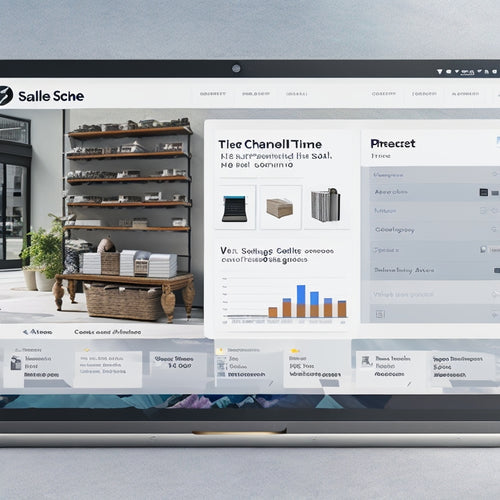
What ROI Can You Expect From Ecommerce Courses?
Share
You can anticipate a significant return on investment (ROI) from ecommerce courses, with top-performing courses providing returns of 200%-500% or more, depending on the skills acquired and business needs. For example, Facebook Ads Management can increase sales by $500/month, yielding a 200% ROI, while Email Marketing Automation can boost conversions by $2,000/month, resulting in a 1000% ROI. To maximize your return on investment, selecting courses that align with your business goals and needs is crucial. By grasping the average cost and expected income growth potential of ecommerce courses, you can make informed decisions that drive genuine growth and profitability.
Key Takeaways
• Ecommerce courses can yield an ROI of 200%-500% for sought-after skills, 100%-200% for general skills, and 50%-100% for beginner-friendly courses.
• Courses teaching Facebook Ads Management, SEO Optimization, and Email Marketing Automation can increase sales by $500-$2,000 per month, resulting in significant ROI.
• The cost of ecommerce courses ranges from $1,000 to $5,000+, but can lead to income growth potential of 20%-50% through increased conversions and higher sales revenue.
• To maximize ROI, it's essential to track ecommerce business growth, measure ROI, and monitor key metrics like website traffic and conversion rates to identify improvement areas.
• The effectiveness of an ecommerce course can be measured by its ability to provide relevant skills, increase sales, and align with business goals, leading to a tangible financial return.
Understanding Ecommerce Course Pricing
When researching ecommerce courses, you'll likely encounter a wide range of pricing options, from free to several thousand dollars, making it crucial to grasp the factors influencing these prices. A pricing comparison is vital to determine the value proposition of each course. You need to ponder what's included in the course, the level of support, and the instructor's expertise. Are you receiving personalized coaching or just access to pre-recorded videos? Are there any additional resources, such as software or templates, that can expedite your learning?
Don't fall for the trap of thinking that the most expensive course is the best. Instead, focus on what each course offers and how it aligns with your goals. A higher price tag doesn't necessarily equate to better results. Look for courses that provide a clear value proposition, outlining precisely what you'll learn and how you'll benefit.
Calculating ROI for Ecommerce Skills
To accurately calculate the ROI of an ecommerce course, you need to determine the monetary value of the skills and knowledge you'll acquire, which can be a challenging task, especially if you're new to the industry. However, it's important to get it right to make sure you're making a worthwhile investment.
Here's a breakdown of how to calculate the ROI of ecommerce skills:
| Skill | Monetary Value | ROI |
|---|---|---|
| Facebook Ads Management | $500/month increase in sales | 200% |
| SEO Optimization | $1,000/month increase in organic traffic | 500% |
| Email Marketing Automation | $2,000/month increase in conversions | 1000% |
| Product Photography | 20% increase in product sales | 400% |
| Influencer Marketing | 30% increase in brand awareness | 600% |
As you can see, the ROI of ecommerce skills can be significant. By focusing on developing high-demand skills, you can greatly increase your earning potential and get an impressive return on your investment. Remember, calculating ROI is not just about numbers; it's about understanding the value of your skills and knowledge in the market.
Average Cost of Ecommerce Courses
You'll find that ecommerce courses can vary greatly in price, with some online programs costing as little as a few hundred dollars and others reaching into the thousands. This vast range in course affordability can make it challenging to determine what you're getting for your money.
However, it's crucial to take into account the potential return on investment (ROI) when selecting an ecommerce course.
On average, an extensive ecommerce course can cost anywhere from $1,000 to $5,000 or more, depending on the level of expertise, course duration, and the reputation of the instructor. Some courses may offer more personalized attention, while others provide access to a community of like-minded entrepreneurs.
When assessing the cost of a course, ask yourself what specific skills you'll gain and how they'll translate to increased revenue in your business.
Ultimately, the cost of an ecommerce course is an investment in your future success. By considering the potential ROI, you can make an informed decision about which course is right for you and your business goals.
Projected Income Growth Potential
By enrolling in a high-quality ecommerce course, one can reasonably expect a significant boost in their online store's revenue, with many students reporting income growth of 20% to 50% or more within the first year. This increase in income potential can have a profound impact on your career advancement, allowing you to scale your business and achieve your goals.
Here are three potential income growth scenarios to expect:
-
Increased conversions: With optimized product listings and effective marketing strategies, you can expect a 25% increase in conversions, resulting in higher sales revenue.
-
Improved average order value: By implementing strategies to increase average order value, you can see a 30% boost in revenue, leading to higher profits.
-
Expanded product offerings: By diversifying your product line and expanding into new markets, you can experience a 40% increase in revenue, opening up new opportunities for growth.
Measuring Course Effectiveness Metrics
As you track the growth of your ecommerce business, it's essential to measure the effectiveness of your course investment, and that means monitoring key metrics that reveal the tangible impact on your bottom line.
You want to know whether the course is generating a strong return on investment (ROI) and driving real growth. To do this, you'll need to track progress and measure success using metrics that matter.
Focus on metrics such as increased website traffic, improved conversion rates, and higher average order values. These metrics will give you a clear picture of how the course is impacting your business.
By analyzing data and identifying areas for improvement, you can refine your strategies and optimize your ecommerce operations for better outcomes. Regularly reviewing and adjusting your approach will help you maximize the ROI of your course investment and drive sustainable growth.
Ecommerce Course ROI Benchmarks
Establishing ecommerce course ROI benchmarks is essential for evaluating your course's financial performance and identifying opportunities for improvement. As you set out to create a profitable ecommerce course, it's important to comprehend what ROI expectations are realistic and how they compare to industry standards.
Here are some ecommerce course ROI benchmarks to keep in mind:
-
200%-500% ROI: This is a reasonable expectation for courses that teach sought-after skills, such as Facebook ads or Amazon FBA.
-
100%-200% ROI: Courses that concentrate on general ecommerce skills, like marketing or branding, may fall within this range.
-
50%-100% ROI: Beginner-friendly courses or those with shorter durations may have lower ROI expectations.
When evaluating your course's ROI, take into account factors like course duration, skill relevance, and industry comparisons. A longer course with highly relevant skills may have higher ROI expectations than a shorter course with more general skills.
Top Performing Ecommerce Courses
You're likely wondering which ecommerce courses have achieved remarkable success, and what sets them apart from the rest. The top performing ecommerce courses share certain characteristics that contribute to their impressive ROI. Here are a few examples:
| Course | Course Benefits | Learning Outcomes |
|---|---|---|
| Shopify Mastery | Learn Shopify optimization, product research, and marketing strategies | Increase conversions, boost sales, and master Shopify |
| Ecom Elites | Discover Facebook ads, Instagram marketing, and sales funnel optimization | Scale your ecommerce business, increase profits, and dominate social media |
| Amazon FBA Ninja | Master Amazon FBA, product sourcing, and inventory management | Build a successful Amazon FBA business, increase sales, and minimize losses |
| Dropshipping Blueprint | Learn dropshipping, supplier negotiation, and customer service strategies | Launch a profitable dropshipping business, reduce costs, and improve customer satisfaction |
These top performing ecommerce courses offer a range of benefits, from Shopify optimization to Amazon FBA mastery. By enrolling in one of these courses, you can expect to achieve significant learning outcomes, such as increasing conversions, scaling your business, and dominating social media. With the right ecommerce course, you'll be well on your way to achieving a remarkable ROI.
Cost-Benefit Analysis of Courses
When considering an ecommerce course, you'll want to weigh the benefits against the costs.
You need to ask yourself: Is the course content valuable enough to justify the financial investment needed?
And will the skills you develop have a significant impact on your online business, making the expenditure worthwhile?
Course Content Value
By calculating the cost-benefit analysis of ecommerce courses, you can accurately determine the course content value that justifies the investment, ensuring a positive return on investment (ROI). This analysis helps you evaluate the relevance of the course material to your business goals and objectives. When the course content aligns with your needs, you can expect significant learning outcomes that drive business growth.
Here are 3 key benefits of a valuable ecommerce course:
-
Relevant Skills Acquisition:
You gain practical skills and knowledge that address specific pain points in your ecommerce business, such as improving conversion rates or optimizing supply chain management. -
Measurable Results:
The course content is designed to produce measurable outcomes, such as increased sales, improved customer engagement, or enhanced brand visibility. -
Time-Efficient Learning:
You learn from experienced instructors and industry experts who provide actionable insights, saving you time and resources in the long run.
Financial Investment Needed
Determining the financial investment required for an ecommerce course necessitates a thorough cost-benefit analysis to ensure that the expenditure aligns with your business goals and objectives. You need to assess the total cost of the course, including any additional resources or tools needed, and weigh it against the potential financial outcomes.
Effective budget planning is essential to guarantee that you're not overspending on a course that may not deliver the desired ROI.
When evaluating the financial investment needed, consider the potential increase in revenue, improved efficiency, and enhanced competitiveness that the course can bring to your business. Will the course help you increase your online sales, reduce costs, or improve customer satisfaction? What're the tangible financial outcomes you can expect from the course?
Skill Development Impact
As you evaluate the financial investment needed for an ecommerce course, you'll also want to contemplate the impact it can have on your skill development, which can greatly influence the overall ROI of the course. A well-structured ecommerce course can catapult your career forward, providing a significant boost to your skill enhancement and career advancement.
Here are three key benefits to ponder:
-
Improved knowledge retention: A good ecommerce course will provide you with a solid foundation in ecommerce principles, ensuring that you retain the knowledge and can apply it in real-world scenarios.
-
Practical application: You'll gain hands-on experience with ecommerce tools and platforms, enabling you to hit the ground running and drive results from day one.
-
Transformative career growth: With the skills and confidence you gain from an ecommerce course, you'll be well-positioned for career advancement, whether that means a promotion, a new role, or even starting your own ecommerce business.
Ecommerce Business Growth Projections
You're likely wondering what kind of growth you can expect from an ecommerce business, and the projections are promising: according to recent research, the global ecommerce market is set to reach $4.9 trillion by 2023, with an annual growth rate of 14.7%. This rapid expansion is driven by shifting consumer behavior, advancements in technology, and the increasing adoption of online shopping.
As a result, revenue projections for ecommerce businesses are looking up, with many entrepreneurs and businesses poised to capitalize on this trend.
When it comes to business growth, industry insights suggest that ecommerce will continue to outpace traditional retail. In fact, online sales are expected to account for over 22% of total retail sales by 2023. This growth is fueled by changing market trends, such as the rise of mobile commerce and social commerce.
As an ecommerce entrepreneur, understanding these trends and projections is essential to developing a successful strategy and staying ahead of the competition. By leveraging these insights, you can position your business for long-term success and maximize your revenue potential.
Maximizing ROI Through Course Selection
By choosing the correct ecommerce course, you can uncover the secrets to maximizing your return on investment (ROI) and propel your business to new heights. A well-thought-out course selection strategy is vital to achieving this goal. It's necessary to identify your business needs and goals, then select a course that aligns with them.
Here are 3 key benefits of selecting the appropriate ecommerce course:
-
ROI optimization techniques: You'll learn proven strategies to increase your ROI, ensuring that your investment in the course pays off.
-
Personalized guidance: A good course will provide you with tailored guidance, assisting you in overcoming specific challenges and achieving your goals.
-
Actionable insights: You'll gain practical insights into the ecommerce industry, enabling you to stay ahead of the competition and drive business growth.
Frequently Asked Questions
Can I Apply Ecommerce Course Skills to Other Areas of Business?
"Did you know 75% of skills learned in one industry are transferable? You can definitely apply ecommerce course skills to other areas of business, leveraging cross-industry application and transferable skills to drive growth and innovation."
How Long Does It Take to See ROI From Ecommerce Courses?
You set realistic expectations, understanding that seeing ROI from ecommerce courses takes time, typically 3-6 months. Your consistent time commitment and effort will ultimately drive the speed of your returns.
Are Ecommerce Courses Suitable for Complete Beginners in Business?
You're taking the first step into the ecommerce jungle, and it's a challenging task, but fear not! Ecommerce courses are suitable for complete beginners, as they'll help you develop essential skills in business fundamentals, online marketing, and product sourcing, setting you up for success.
Can I Get a Refund if an Ecommerce Course Doesn't Work Out?
You'll want to scrutinize the refund policies and success rates of ecommerce courses before enrolling, as some offer guarantees, while others don't; consider alternative learning options and industry research to make an informed decision.
Are Ecommerce Courses Taught by Experienced Entrepreneurs?
You want to know if ecommerce courses are taught by experienced entrepreneurs, and the answer is, many are, but it's important to vet the instructor's entrepreneurial background to guarantee high-quality course content that yields results.
Related Posts
-
Mastering Topical Content Mapping for Effective SEO
Topical content mapping is a critical aspect of search engine optimization (SEO) that can significantly impact a web...
-

What Can You Automate on Shopify
This article examines the potential for automation on the Shopify platform. It discusses the benefits of automation ...
-

Boost Ad Performance and ROI With the Advertiser Success Center
The Advertiser Success Center is a comprehensive platform that offers valuable insights and tools to assist advertis...

